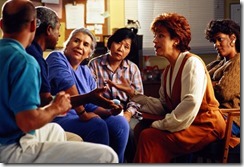 Last year, five of the women on my block were caring for a surviving parent. The conversation at our neighborhood Halloween party and the chitchat while walking the dogs held a mix of frustration, concern and fear.
Last year, five of the women on my block were caring for a surviving parent. The conversation at our neighborhood Halloween party and the chitchat while walking the dogs held a mix of frustration, concern and fear.
“We are on month six of waiting for my mother-in-law’s Medicaid application to be approved.”
“My dad in New York fell again and is in the hospital. I am heading back East tomorrow to get some things in place before he returns home.”
“Mom’s doctor is now suggesting hospice.”
Often in the midst of dealing with our parents’ set of issues, we lose sight of the fact that there are others having similar experiences.
That’s what seemed so special about our neighborhood talks. In some way we were our own little support group, sharing situations and solutions, giving each other words of encouragement and a shoulder to cry on. All of us were in the same boat and somehow it was helpful to talk with someone going through similar circumstances.
While some support groups can be informal, like our neighborhood one, many in our community are more structured. An organized support group led by a skilled facilitator can help individuals cope better and feel less isolated as connections are made with others facing similar challenges.
While not everyone wants or needs support beyond that offered by family and friends, many find it helpful to turn to others outside their immediate circle.
Benefits of joining a support group include feeling less isolated or judged, gaining a sense of empowerment and control, improving coping skills, and freely expressing negative feelings in a safe environment.
At Senior Concerns we run a support group for spouses and family members whose loved ones have cognitive impairment. Those who come to our support group say one of the greatest benefits they experience is the knowledge that they are not alone in their journey. Some of the participants get so much out of the group, they continue to come even after their spouse has died.
While there are many support groups in our community for caregivers of a loved one with specific conditions like Parkinson’s or Alzheimer’s, what seems to be missing is a support group for adult children caring for an aging parent.
That situation carries with it its own set of issues.
Caring for an elderly parent can be challenging enough, but add an angry or stubborn parent or contradictory sibling into the mix and most adult children will feel strain, frustration and perhaps even resentment.
Local resident David Solie is an expert in helping adult children who are searching for a better approach to working with their parents. He is the author of the landmark book, “How To Say It to Seniors: Closing the Communication Gap with Our Elders,” and will be a featured speaker at this fall’s second annual Boomer Bootcamp.
Beginning Mon., Sept. 16 as a program of Senior Concerns’ Caregiver Support Center, David Solie will offer a monthly support group for adult children caring for an aging parent, from 7 to 8:30 pm at The Reserve, 3575 N Moorpark Road in Thousand Oaks. This free support group will be limited to 15 participants.
If you would like to join this group, you must make an advance reservation by calling Senior Concerns at (805) 497-0189.
You may also call that number if you would like more information about Senior Concerns’ support group for individuals caring for a loved one with cognitive impairment.
Talking (and laughing and crying) with others who share common concerns and are going through similar experiences can be a lifesaver.
More ...
Tags: support groups,caring for an aging parent,David Solie,Senior Concerns